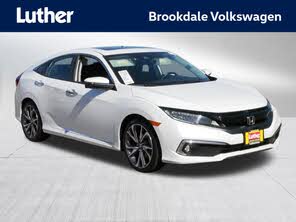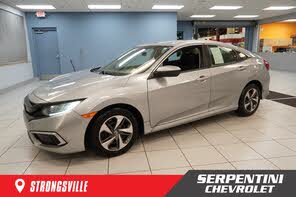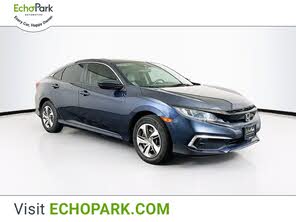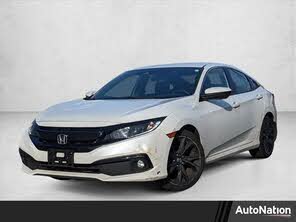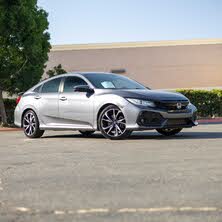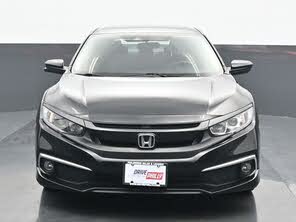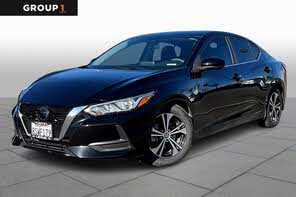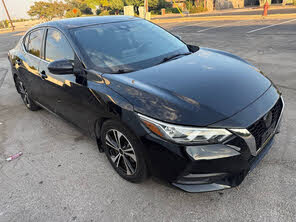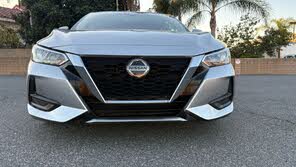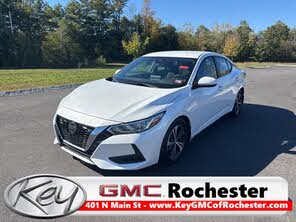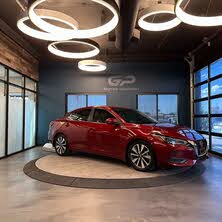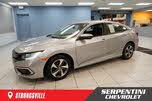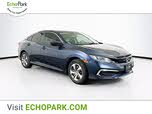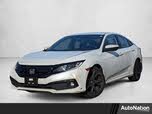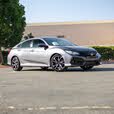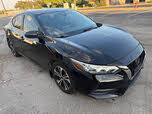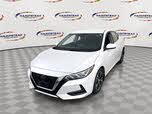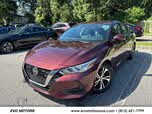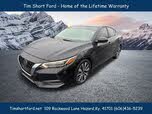2019 Honda Civic vs 2020 Nissan Sentra
Overview | |
MSRP$19,550 | MSRP$19,310 |
Listings1373 | Listings532 |
Ratings & Reviews | |
User Reviews | User Reviews |
Expert reviews7.8 out of 10 | Expert reviews7.7 out of 10 |
Pros
Cons
| |
2019 Honda Civic Reviews SummaryThe tenth-generation Civic has been out since 2016, and for 2019, Honda makes only minor tweaks to this compact car's winning formula of style, value, and performance. Lots of cars are good these days, but the Civic has been consistently good for more than 45 years. This is a car that drives and feels like a more expensive car, and whether you choose a sedan, coupe, or hatchback among four engines and two transmissions—hooray for variety—the Civic rewards you. The 2019 model reminds us why. | |
2020 Nissan Sentra Reviews SummaryFor 38 years, Nissan has peddled the Sentra as its definitive starter car. It’s a household name like Civic, Corolla, and Jetta—all of which are brand-new or have been refreshed in the last couple of years. The eighth-generation Sentra has the look of a larger, more luxurious car. It reflects major upgrades in style, technology, and driving dynamics. Compact sedans have a high bar to clear, even at $20,000. The 2020 Sentra delivers in every respect. | |
Popular Features & Specs | |
Engine2.0L 158 hp I4 | Engine2.0L 149 hp I4 |
Drive TrainFWD | Drive TrainFWD |
Seating Capacity5 | Seating Capacity5 |
Horsepower158 hp @ 6500 rpm | Horsepower149 hp @ 6400 rpm |
MPG City25 | MPG City29 |
MPG Highway36 | MPG Highway39 |
Engine | |
Engine Name2.0L 158 hp I4 | Engine Name2.0L 149 hp I4 |
Torque138 lb-ft @ 4200 rpm | Torque146 lb-ft @ 4400 rpm |
Horsepower158 hp @ 6500 rpm | Horsepower149 hp @ 6400 rpm |
DrivetrainFWD | DrivetrainFWD |
Fuel Economy | |
MPG City25 | MPG City29 |
MPG Highway36 | MPG Highway39 |
Interior | |
Seating Capacity5 | Seating Capacity5 |
Safety | |
Front Crash Overall5 | Front Crash Overall4 |
Side Crash Overall5 | Side Crash Overall5 |
Dimensions & Capacity | |
Cargo Space15.1 cu ft | Cargo Space14.3 cu ft |
Curb Weight2742 lbs | Curb Weight3047 lbs |
Height55.7 in | Height56.9 in |
Length182.3 in | Length182.7 in |
Width70.8 in | Width71.5 in |
Wheelbase106.3 in | Wheelbase106.8 in |
Maximum Payload | Maximum Payload910 lbs |
Number of doors4 | Number of doors4 |
Overview | ||
MSRP | $19,550 | $19,310 |
Listings | ||
Ratings & Reviews | ||
User reviews | ||
Expert reviews | 7.8 out of 10Read full review | 7.7 out of 10Read full review |
Pros & cons | Pros
Cons
| |
Summary | The tenth-generation Civic has been out since 2016, and for 2019, Honda makes only minor tweaks to this compact car's winning formula of style, value, and performance. Lots of cars are good these days, but the Civic has been consistently good for more than 45 years. This is a car that drives and feels like a more expensive car, and whether you choose a sedan, coupe, or hatchback among four engines and two transmissions—hooray for variety—the Civic rewards you. The 2019 model reminds us why. | For 38 years, Nissan has peddled the Sentra as its definitive starter car. It’s a household name like Civic, Corolla, and Jetta—all of which are brand-new or have been refreshed in the last couple of years. The eighth-generation Sentra has the look of a larger, more luxurious car. It reflects major upgrades in style, technology, and driving dynamics. Compact sedans have a high bar to clear, even at $20,000. The 2020 Sentra delivers in every respect. |
Video | ||
Popular Features & Specs | ||
Engine | 2.0L 158 hp I4 | 2.0L 149 hp I4 |
Drive Train | FWD | FWD |
Seating Capacity | 5 | 5 |
Horsepower | 158 hp @ 6500 rpm | 149 hp @ 6400 rpm |
MPG City | 25 | 29 |
MPG Highway | 36 | 39 |
Engine | ||
Engine Name | 2.0L 158 hp I4 | 2.0L 149 hp I4 |
Torque | 138 lb-ft @ 4200 rpm | 146 lb-ft @ 4400 rpm |
Horsepower | 158 hp @ 6500 rpm | 149 hp @ 6400 rpm |
Drivetrain | FWD | FWD |
Fuel Economy | ||
MPG City | 25 | 29 |
MPG Highway | 36 | 39 |
Interior | ||
Seating Capacity | 5 | 5 |
Safety | ||
Front Crash Overall | 5 | 4 |
Side Crash Overall | 5 | 5 |
Dimensions & Capacity | ||
Cargo Space | 15.1 cu ft | 14.3 cu ft |
Curb Weight | 2742 lbs | 3047 lbs |
Height | 55.7 in | 56.9 in |
Length | 182.3 in | 182.7 in |
Width | 70.8 in | 71.5 in |
Wheelbase | 106.3 in | 106.8 in |
Maximum Payload | 910 lbs | |
Number of doors | 4 | 4 |
The 2019 Honda Civic, while not as stylish as the 2019 Mazda3, still offered a distinct upscale appeal. It featured a new gloss-black upper grille, a revised lower bumper, and larger 18-inch wheels, giving it a graceful silhouette reminiscent of an Audi A7. The Touring-trim test car boasted chrome door handles and LED headlights that resembled tiny crystals, adding to its sophisticated look. The Civic Hatchback, with its aggressive rear end, and the Coupe model, provided unique styling options, including vibrant paint colors that stood out in traffic. Inside, the Civic maintained a high-tech yet simplified theme with a central LCD screen and minimal buttons, ensuring a clean and high-quality finish.
In contrast, the 2020 Nissan Sentra transformed its image from a cost-conscious design to a more appealing and stylish compact sedan. The Sentra's design was inspired by the Altima, giving it a more substantial presence. It featured a lower and wider body, with elegant creases in the sheet metal that added an expensive look. The V-shaped grille and jeweled headlights enhanced its mature and recognizable appearance. Inside, the Sentra's interior was upgraded with a flat-bottom leather steering wheel and a leatherette dash, offering a feel akin to entry-level luxury cars. The SV Premium Package further elevated the interior with quilted tan leather seats and Infiniti-grade materials, making it a close competitor to the Mazda3 in terms of interior class.











The 2019 Honda Civic offered a range of engine options, starting with a 2.0-liter inline 4-cylinder engine producing 158 horsepower and 138 pound-feet of torque. The more powerful trims, like the Touring, featured a turbocharged 1.5-liter inline-4 with 174 hp and 162 lb-ft. The hatchback models came with a turbo engine making 180 hp in the Hatchback Sport. The Civic Si and Type R models delivered even more power, with the Si producing 205 hp and the Type R a staggering 306 hp. The Civic's engines were praised for their smoothness and refinement, with the turbo engine offering quick response and better mid-range acceleration. The manual transmissions were noted for their excellent clutch and shifter engagement, while the CVT impressed with its ability to simulate gear ratios without straining the engine. The Civic's handling was superb, with excellent steering feel, strong brakes, and a suspension that balanced sportiness with comfort.
The 2020 Nissan Sentra, on the other hand, featured a 2.0-liter inline 4-cylinder engine with 149 horsepower and 146 pound-feet of torque, paired with a CVT. While it lacked the turbocharged options of the Civic, the Sentra's CVT was smooth and responsive, mimicking gear changes effectively. The Sentra's steering response and handling were highlights, thanks to an independent suspension that replaced the previous torsion beam rear axle. The ride quality was agreeable, and the steering was quick with good on-center feel. The Sentra's fuel economy was impressive, with an EPA rating of 29 mpg city, 39 highway, and 33 combined. Overall, the Sentra provided a comfortable and controlled driving experience, though it wasn't as sporty as the Civic.
The 2019 Honda Civic's interior was user-friendly, with a touchscreen that included a volume knob and shortcut buttons, addressing previous usability issues. The steering wheel controlled the central display, providing easy access to various functions. The rear seat offered ample space, with optional heated seats and decent head- and legroom. Cargo space was generous, with the sedan offering 15.1 cubic feet and the hatchback up to 46.2 cubic feet with the seats folded. The center console provided practical storage solutions, and visibility was good in all directions.
The 2020 Nissan Sentra's backseat was surprisingly spacious, accommodating taller passengers comfortably. The front seats featured Nissan's Zero Gravity cushioning, reducing fatigue on long drives. The lowered body profile improved side visibility, though the rear window was less effective. The trunk offered 14.3 cubic feet of space, with foldable seatbacks for added versatility. The driving position and controls were well-placed, with traditional knobs for volume and tuning, enhancing ease of use.
The 2019 Honda Civic's infotainment system, while once impressive, had become dated compared to newer Honda models. However, it still offered standard Apple CarPlay and Android Auto, along with a 450-watt, 10-speaker stereo. Honda's LaneWatch provided a live feed of the blind spot, enhancing safety. The navigation system was a standout, with quick and accurate voice-based input.
The 2020 Nissan Sentra lacked some advanced features like ProPilot and navigation, but it came standard with Apple CarPlay, Android Auto, Amazon Alexa, and WiFi on the mid-level SV. The SV also included dual-zone climate control, adaptive cruise control, and remote engine start. The Sentra offered a full suite of driver-assist features, making it a well-equipped option for its price.
The 2019 Honda Civic came with Honda Sensing as standard on most trims, offering forward-collision alert, lane-keep assist, and adaptive cruise control. The Civic received top ratings from the IIHS and NHTSA, with the exception of a four-star rating for the coupe's passenger-side frontal crash test.
The 2020 Nissan Sentra had not been crash-tested by the NHTSA or IIHS, but it was expected to receive top ratings. It included rear side airbags, knee airbags, and a comprehensive suite of safety features, such as forward and reverse emergency braking, pedestrian detection, and blind-spot monitoring.
CarGurus highlights
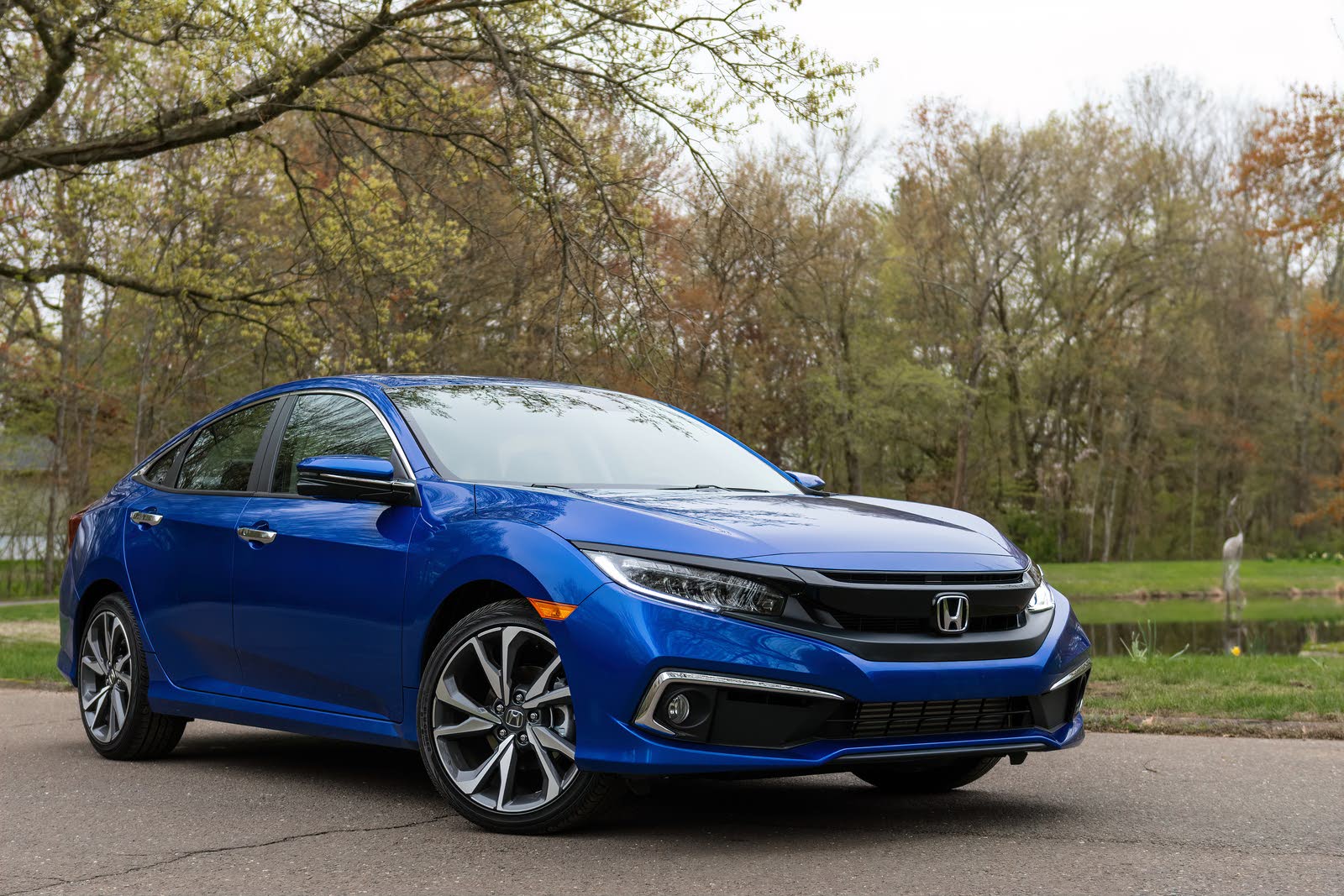
According to CarGurus experts, the overall rating for the 2019 Honda Civic is 7.8 out of 10, while the 2020 Nissan Sentra scores 7.7 out of 10. Based on these ratings, the 2019 Honda Civic is the recommended choice, offering a more engaging driving experience, spacious interior, and advanced safety features.
Choose the 2019 Honda Civic if:
- You prioritize a sporty driving experience with multiple engine options, including powerful turbocharged variants.
- You value a spacious interior with ample cargo capacity, especially in the hatchback model.
- You want advanced safety features like Honda Sensing as standard on most trims.
Choose the 2020 Nissan Sentra if:
- You prefer a stylish and modern design with a comfortable and upscale interior.
- You seek a well-equipped vehicle with standard Apple CarPlay, Android Auto, and a full suite of driver-assist features.
- You appreciate a smooth and controlled ride with good fuel economy.
CarGurus highlights

According to CarGurus experts, the overall rating for the 2019 Honda Civic is 7.8 out of 10, while the 2020 Nissan Sentra scores 7.7 out of 10. Based on these ratings, the 2019 Honda Civic is the recommended choice, offering a more engaging driving experience, spacious interior, and advanced safety features.
Choose the 2019 Honda Civic if:
Shop Now- You prioritize a sporty driving experience with multiple engine options, including powerful turbocharged variants.
- You value a spacious interior with ample cargo capacity, especially in the hatchback model.
- You want advanced safety features like Honda Sensing as standard on most trims.
Choose the 2020 Nissan Sentra if:
Shop Now- You prefer a stylish and modern design with a comfortable and upscale interior.
- You seek a well-equipped vehicle with standard Apple CarPlay, Android Auto, and a full suite of driver-assist features.
- You appreciate a smooth and controlled ride with good fuel economy.

By: CarGurus + AI
At CarGurus, our team of experienced automotive writers remain at the heart of our content operation, conducting hands-on car tests and writing insightful guides that are backed by years of industry experience. To complement this, we are harnessing AI to make our content offering more diverse and more helpful to shoppers than ever. To achieve this, our AI systems are based exclusively on CarGurus content, ratings and data, so that what we produce is both unique to CarGurus, and uniquely helpful to car shoppers.


